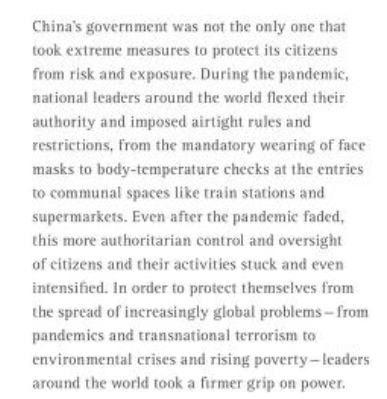
The Post-Covid-19 World: A Permanent Dystopia (Excerpt)
- Details
- Published: 30 October 2020
(note: this is an excerpt, written in April, from When China Sneezes: from the Coronavirus Lockdown to the Global Politico-Economic Crisis, a collection of long-form essays on the pandemic and the world's reactions to it. read the full chapter - and the work of a dozen other excellent writers, including the great Cynthia McKinney, the volume's editor - here. DO NOT purchase the book through Amazon, unless you never want to receive the book...)

PSYCHO(PATHO)LOGICAL WARFARE
Just as putting a country on a war footing predisposes its people to expect sacrifices—of luxuries, of liberties, even of basic needs—so too does it elicit a predictable and easily manageable form of reactionary patriotism. With two generations of Americans now having spent their entire adult lives in a country that was technically “at war,” the effect won’t be as pronounced stateside as when the US kicked off the War on Terror. Nevertheless, a spike in fear will manifest in xenophobia (already unprovoked attacks on Chinese and other Asians are on the rise) and suspicion of outsiders, even if the “outsiders” are just from across state lines. When one’s world has shrunk to the boundaries of one’s home over months of quarantine and “social distancing,” everyone is an outsider. In the UK, where cultural memory of having to “do without” during wartime is stronger, alerts from the National Grid that blackouts may occur (because of a virus?) lend verisimilitude to their leaders’ wartime rhetoric.
Social Distancing is just another term for alienation, and alienation has long been the means by which control of the individual is achieved. A person who has been alienated from the land, from society, from his family, and finally from himself is putty in the hands of his controllers, defenseless against any kind of psychological operation from totalitarian thought-reform down to the lowliest advertisement. Separated from their communities and forced to interact via artificial means, individuals under lockdown lose touch with their very humanity. There’s a reason why solitary confinement has been banned in many countries and considered a form of torture in many more.
Isolation’s negative effects on the individual are not merely psychological, either. Just a year ago, thought-pieces pondering the central role of loneliness in many common health problems were a dime a dozen. Social isolation, study upon study has found, is as deadly as smoking or obesity, with multiple studies finding it causes weakening of the immune system, inflammation, and several other ailments that would work synergistically with the coronavirus to greatly increase the likelihood of death. In fact, loneliness is most lethal to the elderly—the population most at risk for coronavirus. Social distancing not only does not save these lives—it actively helps end them.
An individual cut off from other human beings and the outside world loses touch with reality, becoming reliant on a media that has proven itself to lie as often as it tells the truth. Only by enforced isolation could the ruling power structure begin to rebuild the trust it has steadily lost over the past several decades, immersing the individual in a sort of epistemological sensory deprivation chamber and offering only the establishment narrative as an alternative to darkness.
Questioning authority became more rare, as it always does in times of war—as western countries inched closer than ever to criminalizing it. The average American was only too willing to scrap their constitutional rights in exchange for a vague promise of safety from a virus, just as they’d been quick to invite the government into their private lives in return for no more 9/11s. Given the prevailing narrative that “conspiracy theories” about coronavirus are a public health hazard, questioning the vaccine, when it arrives, will likely prove the camel’s nose under the First Amendment tent.
“Authority” now definitively includes medical authorities. As the foot soldiers on the front lines of the “war” on coronavirus, doctors and public health professionals became above reproach. The bizarre “balcony applause videos” heavily pushed on establishment media channels became the yellow ribbons and ubiquitous post-9/11 flag stickers of their day. As physicist Neil deGrasse Tyson quipped on late-night TV in what was not quite a joke, the coronavirus epidemic was in one sense a behavioral experiment regarding whether people can be made to listen to scientists—but it goes without saying that only the practice of allopathic (pharmaceutical) medicine conferred this authority. If it didn’t require a prescription, it was declared anathema, even tried-and-true herbal remedies like elderberry, echinacea, and astragalus whose immune-boosting and properties were scientifically established. Products containing colloidal silver, famous for its antibacterial and antiviral properties, were temporarily yanked from Amazon, supposedly because televangelist Jim Bakker and conservative political performance artist Alex Jones had claimed it could cure coronavirus.
Click on the link for the rest.